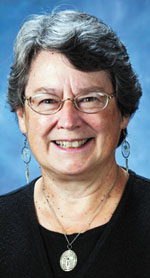By Corinne Winter

We have just passed the middle of our spring semester and some students are having an attack of “what can I do to get a better grade?” It always makes me a bit sad when they seem more eager to collect points than to learn more or to dig more deeply into the important questions — especially in theology. At the same time, of course, it is completely understandable that they want to keep up an impressive average. And they want to know the most certain way to do that.
At the same time, I have continued to read Pope Francis’ Apostolic Exhortation and have had the opportunity to discuss part of it with colleagues. One of them pointed out the pope’s statement at the end of the first chapter: “I prefer a Church which is bruised, hurting, and dirty because it has been out on the streets, rather than a Church which is unhealthy from … clinging to its own security (EG 49).”
Does the pope suggest that we should be uncertain about our faith? Certainly not. He speaks in the letter of unchanging truth, of the core of the Gospel message, of not mincing words when we express certain convictions. And at the same time, he calls for communal discernment, a willingness to examine Church structures and ways of expressing our faith to see whether we need to make changes and/or foster diverse expressions within diverse cultures in order to preach the Gospel more effectively.
After the Second Vatican Council, some members of the Church expressed grave concerns about changes that were taking place, and the loss of a kind of certainty that had previously characterized their experience of the Church. Mass would always be the same no matter where they were. A person’s moral obligations were clear and could be enumerated. The Church’s teachings were set and their language known. I recall one friend saying that the Church had (past tense deliberate) been a “Rock of Gibralter.” In my youthful brashness, I made some retort about the lack of life in a rock.
It seems to me that my friend and I each had an important point. In the Church, we need both certitude about the faith itself, about the Tradition with a capital T; and willingness to let go of false security for the sake of the Lived Tradition. Yves Congar, a Dominican theologian who served as a theological expert at Vatican II, says in his huge volume on the Holy Spirit that our faith in the Spirit allows us as a Church to be faithful to the Tradition while making progress in responding to a changing world. The Holy Spirit is the Spirit of Christ and will lead us constantly toward union with Christ and his mission. At the same time, the Spirit moves freely throughout the world, is not limited to a few structures, rituals or persons, and may surprise us by showing us new ways of expressing our fidelity.
Pope John XXIII, in calling for a new Council of the Church, expressed his desire for a “New Pentecost,” a powerful experience of the Spirit that would re-energize the Church and teach us to speak the Gospel in the new languages found in a changing world. Pope Francis is echoing that call, asking us to pay particular attention to the need for healing and the means of ecclesiastical expression that may provide obstacles to faith for those who are, in fact-searching and longing for the message we have to offer.
Lent may be a good time for us to practice openness to challenge, to new ideas that take us outside our comfort zones so that we may discern what is central to our faith and what expressions of that faith may be serving as inadequate sources of a certainty that can come only from the work of the Holy Spirit among us.
(Corinne Winter is a professor of theology at St. Ambrose University in Davenport.)







